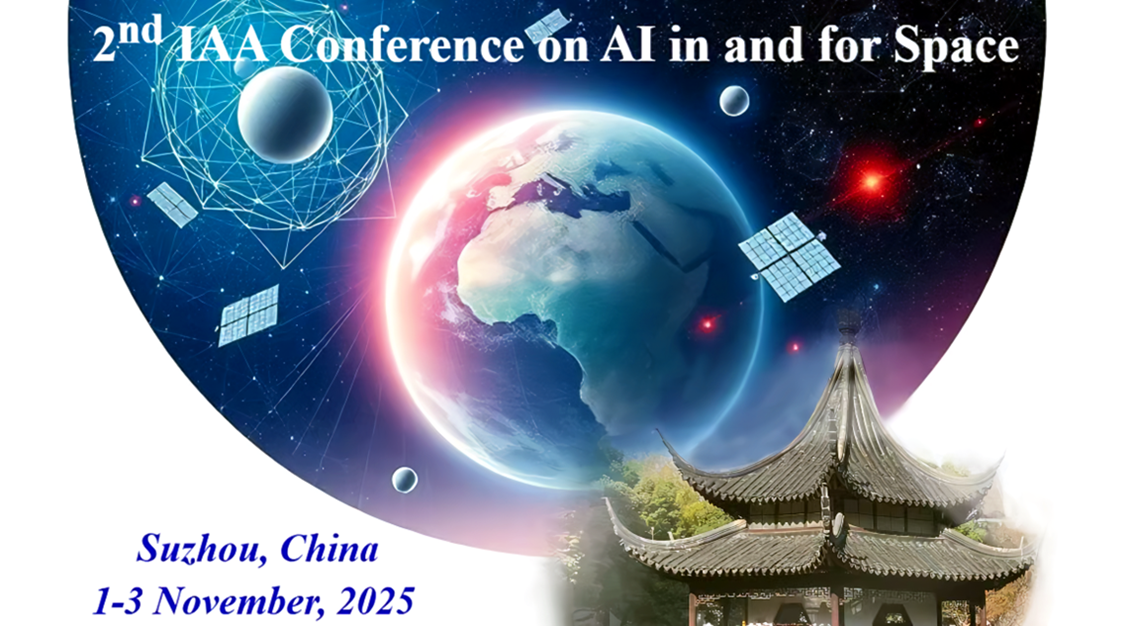![]()
CALL FOR PAPERS

Submission deadline: 15 July, 2025 30 August, 2025
IAA-SPAICE 2025 envisions a vivid exchange of ideas, concepts, and challenges between the fields of AI and space, building a bridge between them. Thus, we encourage a broad range of scientists and practitioners from both fields to submit their ideas and work. Specifically, we invite researchers and engineers from the space domain to contribute their work on applying AI methods to space applications. Similarly, we invite researchers and engineers from the AI area to contribute work on novel methods they believe would be of high impact and interest to the space domain.
To contribute to IAA-SPAICE 2025, please submit a short paper of up to 4 pages (excluding references, acknowledgments, data, ethics statements and funding statements). Submitted papers should focus on both novel/emerging AI techniques and/or their applications to specific space domains (see below for a list of topics). Papers will be selected for oral and poster presentations following a single round of double-blind peer review. Authors of papers accepted for an oral presentation will be invited to submit a revised manuscript for inclusion in the conference proceedings. Template and submission guidelines can be found below. You can find the submission page here.
Short papers accepted for oral presentation will be published as part of the conference proceedings. We further plan to compile up to two special issues on AI and space in collaboration with renowned scientific journals, Elsevier Acta Astronautica (SCI,EI) and Springer Astrodynamics(EI). During submission, you can select the option indicating your interest in submitting an extended paper for a special issue after the conference. Details on the special issues will follow closer to the conference.
We strongly support open science practices, and therefore conference proceedings will be made publicly available under the CC-BY-4.0 licence. Authors of accepted papers retain the copyright of their work and are free to use it in follow-up publications. We further encourage authors to share their accepted publications on pre-print servers such as arXiv with a reference to the IAA-SPAICE 2025 conference.
For an accepted paper to be included in the program and/or proceedings of IAA-SPAICE 2025, at least one of the paper’s authors has to be registered and attend the conference in person to present their paper. Authors can only register for and present one of their papers.
Covered topics in IAA-SPAICE 2025 will mainly, but not exclusively, focus on the following application domains and AI techniques.
(1) Application domains
- Guidance, Navigation, and Control
- Astrophysics and Astronomy
- Spacecraft Operations
- Mission Planning and Scheduling
- On-board AI (hardware and software)
- Earth Observation
- Telecommunications
- Robotics
- Materials and Habitats
- Satellite Communication and Networking
(2) AI techniques
- Deep learning architectures (Transformers, convolutional neural networks, autoencoders, graph neural networks, physics-informed neural networks, …)
- Shallow learning architectures (decision trees, kernel machines, Gaussian processes, AutoML, reservoir computing, …)
- Probabilistic and causal models (Bayesian inference, generative models, …)
- Optimization and control (evolutionary & genetic algorithms, reinforcement learning, …)
- Efficient learning paradigms (zero-shot learning, one-shot learning, few-shot learning, continual learning, meta-learning, ...)
- Theory and foundations of AI (computational complexity, generalization bounds, explainability, interpretability, ...)
- Natural language processing (large language models, reasoning, ...)
- Computer Vision (image segmentation, object detection, …)
- Neuro-inspired AI (spiking neural networks, neuromorphic computing, analog computing, ...)
- Emerging hardware systems (quantum computing, AI accelerators, in-memory computing, hardware/software co-design, …)
- Evaluation (methodology, metrics, benchmark datasets, meta studies, ...)
- Social and economic aspects of machine learning (energy demands, environmental impact, data privacy, governance, security, ...)
If your work on AI and space does not fall in any of these application domains and/or AI techniques, you can select “Other” in the drop-down menu during submission and specify a custom application domain / AI technique. In addition, you can provide keywords that describe your work in more detail.
Submission template and guidelines
The following template has to be used to prepare the short paper: Template_IAASPAICE_2025(Word), or Template_IAASPAICE_2025(LaTeX).
For users who are unfamiliar with LaTeX or do not have a local LaTeX editing environment, the use of the Overleaf platform is highly recommended. Overleaf is web-based, requires no installation, and offers a user-friendly interface. It is accessible at: https://www.overleaf.com.
In order to ensure a uniform look of the conference proceedings, please do not adjust the provided template style. A guideline and typesetting examples are provided within the template. The following key guidelines should be followed when preparing the short paper:
- The maximum page limit is 4 pages, excluding references, acknowledgments, data, ethics and funding statements, i.e., these do not count towards the page limit
- The short paper should contain the following sections: an abstract (200 words maximum), an introduction, results, and a discussion. Additional sections and subsections can be added as required.
- The paper must be submitted with authors and affiliations removed. This is done by setting the “doubleblind” variable in main.tex to “true” (this is the default).
- Please do not add page numbers or other footnotes / headers to your manuscript. We will add these when preparing the conference proceedings.
- You must submit the compiled PDF file of your paper to be considered for the conference. If you are new to LaTeX, we recommend you to use the online editor Overleaf to prepare your manuscript. To start writing the paper, click on “New Project” at the top left, select “Upload Project”, and then drag and drop the LaTeX template (a zip folder named “Template_IAA-SPAICE_2025”) provided at the beginning of this section into the menu that pops up.
Contact
For questions regarding the submission, please submit your inquiries through the form below. The committee will respond via email.


